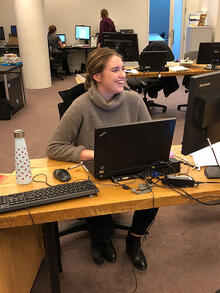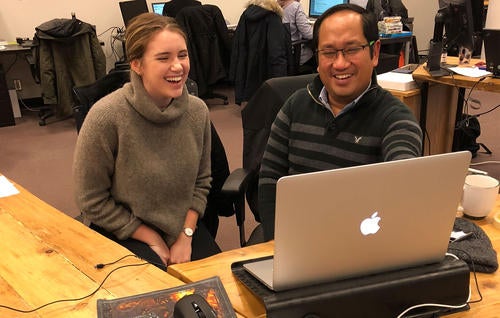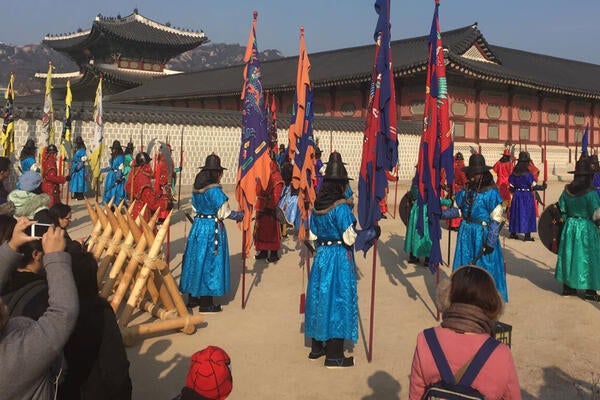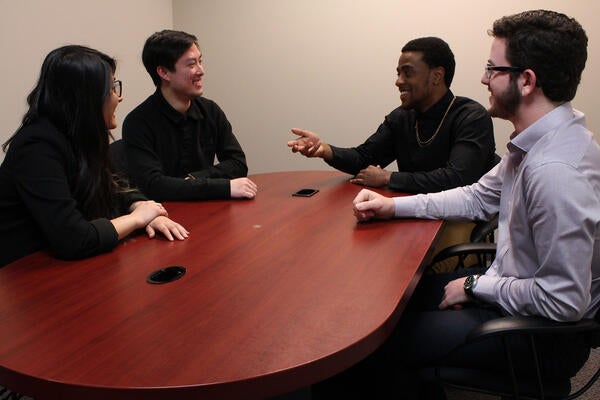
National Co-op & WIL Week Profile #3: Hannah Dubber
Third-year Environment, Resources and Sustainability student Hannah Dubber kicks off her co-op in Kitchener as Program Coordinator with Sustainable Waterloo Region.

Third-year Environment, Resources and Sustainability student Hannah Dubber kicks off her co-op in Kitchener as Program Coordinator with Sustainable Waterloo Region.
By University RelationsMarch 19 – 23 is National Co-op and Work-integrated Learning (WIL) Week, and the University of Waterloo is celebrating its students’ co-op and WIL opportunities.
Our third feature recognizes Hannah Dubber, a third-year Environment, Resources and Sustainability student with minors in Geography and Environmental Management and Anthropology. Dubber is currently completing her fourth co-op term as Program Coordinator with Sustainable Waterloo Region (SWR) in Kitchener. The role has Dubber involved in SWR programs, including ClimateActionWR (Waterloo Region), the Regional Sustainability Initiative and the evolv1 project. Dubber is also involved in econsultation processes and speaks with municipal councils/committees regarding long-term greenhouse gas reduction in the Region of Waterloo, reaching out to community organizations for her business development team, and processes accounts receivable/payable for the finance team.
 Q: What has been one of your best co-op experiences?
Q: What has been one of your best co-op experiences?
A: This is such a difficult question to answer! I have had many great co-op experiences but my current co-op position stands out as one of the best. It has been extremely interesting and beneficial for my learning to work in the non-profit sector, as the majority of my other positions have been within government. The work I do here feels important and has given me the opportunity to witness how local organizations can make a difference in terms of minimizing climate change and generally promoting sustainability in businesses. I am already thinking about coming back to volunteer in the future because the organization is just that awesome!
Q: What has been one of your most challenging co-op experiences and how did you overcome it?
A: Each one of my co-op terms has had its challenges. However, one instance stands out in my mind. During my second co-op term, working in the field of outdoor education, I was asked if could take on a primary role, teaching and looking after a group of children. I wasn’t entirely comfortable yet with the material and wasn’t feeling entirely comfortable teaching on my own yet. It was a challenge for me to tell my supervisor that I wasn’t ready to take on such a role. Once I did, however, I discovered that it is important, especially as a co-op student, to be honest with your supervisor about what you are comfortable doing.
Q: What has your co-op work term taught you about yourself and what you might pursue in your future?
A: All of my co-op terms have taught me something about myself. However, in all of my co-op experiences I have reaffirmed that I need to be challenged at work, whether that is the work itself or with conflicting priorities that requires strategic scheduling. I have also learned that I like to have feedback on my work, whether praise or constructive criticism to gauge how I am performing in the workplace. In addition, through my experience, I have discovered areas of employment that I would be interested in pursuing in the future as well as an interest to volunteer in areas outside of my place of work.
 Q: What is the biggest difference between being a student and a co-op?
Q: What is the biggest difference between being a student and a co-op?
A: I think the biggest difference between being a student and being a co-op is that you are accountable to something greater than yourself. As a student, if your work is incomplete or not done well, it only really affects you. In comparison, as a co-op, your work needs to be done on time and be done well as your co-workers and supervisor are relying on you to do what you said you would do. In addition, as a student, you are, for the majority, only representing yourself and your individual reputation. However, as a co-op, you are also representing the University of Waterloo and the co-op program.
Q: Anything embarrassing happen while on a work term?
A: On my first day on my second work term, working in outdoor education, I was helping to sort out materials to get them organized for the students to come. I was trying put all the large thermometers together and ended up dropping one. It smashed all over the floor, glass everywhere and the red dye all over the table and ground. Not one of my proudest moments and definitely not the best way to start my first day, but we all laughed about it in the end!
Q: What was your co-op interview process like and what tips would you give upcoming students?
A: For my first two work terms, the co-op interview process was a bit intimidating. The Tatham Centre can sometimes feel stressful just when walking through the building. In addition, getting used to different mediums of interviewing, in-person, over the phone and webcam, takes some time. However, there are strategies I have employed to help make the process more enjoyable. I always print out my cover letter, resume and the job description. I write the room number/call centre assigned to me on the job description page just in case I don’t remember what the paging desk says. I always print out my resume and cover letter, both so I can look over it before the interview begins, so I can reference it during the interview, and also so I can offer it to the interviewer in case they needed it. Another, and possibly odd, tip is where to sit when you are waiting for your name to be paged. I found it to be much more calming to sit in the chairs that are under the stairs rather than the ones in the main area by the paging desk. For some reason it’s a bit calmer over there and allows me to focus on last minute prep for interviews.

Q: What will you miss most about your co-op work term?
A: So many things! This co-op term has been one of the highlights of my entire co-op experience! Being able to live, work and enjoy Waterloo Region has been an amazing way to get to know the area even better than as a student. Working in the non-profit sector has truly shown me what it means when people say that hard work pays off. My work here is extremely valued and I feel more like a member of the team than a co-op student. I will truly miss the team here and I hope to have the opportunity to work with the organization again in the future.
Q: What has been your best co-op perk or memory?
A: The best co-op perk has to be the great people you meet along the way. Although there will inevitably be people you don’t like, you will likely find a group of other co-op students or co-workers that you enjoy spending time with. With each co-op term, I have gained friends, many of whom I am still in contact with today!

Read more
Astronomy and Physics student, Emily Pass, wins faculty, provincial and national Co-op Student of the Year Awards.

Read more
Second-year mathematical physics student heads to South Korea for unforgettable co-op experience.

Read more
Third-year Honours Arts student Aaron Cole excels in Waterloo's new work-integrated learning and experiential education certificate program, EDGE.
The University of Waterloo acknowledges that much of our work takes place on the traditional territory of the Neutral, Anishinaabeg, and Haudenosaunee peoples. Our main campus is situated on the Haldimand Tract, the land granted to the Six Nations that includes six miles on each side of the Grand River. Our active work toward reconciliation takes place across our campuses through research, learning, teaching, and community building, and is co-ordinated within the Office of Indigenous Relations.